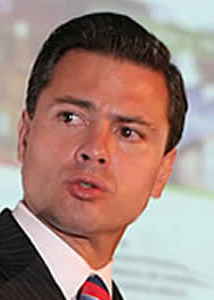MEXICO CITY, (Reuters) – The discovery in Mexico of almost $2 million cash in the luggage of a state government official has triggered a round of mud-slinging in the run-up to the presidential election in July.

Mexico has very strict campaign financing rules with presidential candidates restricted to spending less than 495 million pesos ($38 million) on campaigning before the July 1 vote, which the opposition Institutional Revolutionary Party, or PRI, is favoured to win.
That contrasts sharply with the huge amounts being raised now in the U.S. election race north of the border. President Barack Obama’s team raised $130 million last year alone.
The bundles of notes discovered in the luggage amounted to 25 million pesos ($1.9 million). Much of the cash was in fresh 1,000 peso bills and it was seized from a Veracruz state official disembarking from a private flight at Toluca airport, capital of the State of Mexico. Both states are governed by the PRI. The official said he was making a legitimate payment to a company – but the ruling conservative National Action Party, or PAN, said that was an “insult to the intelligence of Mexicans.”
“Cleanliness in the management of political campaign funds is a pressing need that shows the difference in the behavior of parties and candidates who want to rule this country,” the PAN said in a statement.
The saga is reminiscent of the “Pemexgate” scandal in 2000, when the oil workers’ union was accused of funneling tens of millions of dollars from the state oil company to a presidential candidate’s campaign. No one was punished in that case.
“Of course it’s suspicious that in an election year the Veracruz government found it so important to send 25 million pesos in cash to Toluca to cover expenses in Veracruz,” said political analyst Sergio Sarmiento.
“It was so urgent that instead of making an electronic transfer, which would be instantaneous, they preferred to send the money in two suitcases in a private plane.”
Toluca is capital of the home state of the PRI’s presidential candidate and the clear front-runner, Enrique Pena Nieto. His party reacted angrily to the suggestion Veracruz state funds were being diverted to bankroll PRI campaigns.
‘NO COINCIDENCE’
“This is absolutely false. We demand the accusers present proof,” the PRI said in a statement. “Enough already with the use of the instruments of justice for electoral purposes.”
The saga has underlined the fears of some Mexicans that illicit revenue, including from powerful drug trafficking cartels, could find its way into political pockets, although there is no suggestion that the cash seized in this case was illegally acquired.
The PAN said it was “no coincidence” the money was taken to Toluca, the base of Pena Nieto’s campaign. It posed a laundry list of questions about the payment, including why such a large sum was to be handed over in cash.
The PRI ruled Mexico for seven decades before being toppled in 2000 by the PAN. Pena Nieto, 45, hopes his youthful, energetic image will win over voters who are wary of returning the PRI’s old guard to power.
President Felipe Calderon’s PAN has not yet picked its candidate, but leading in the polls is the only woman in the race, former education minister Josefina Vazquez Mota, 51.
Whoever wins the election in July will have to tackle widespread poverty, increase weak tax revenue and improve a failing education system. About half of Mexico’s population lives below the poverty line, so the photos of stacks of pink 1,000 peso bills seized in Toluca grabbed the public’s attention.
The explanation given by the Veracruz authorities was largely derided, with one commentator questioning why the state’s governor would send a functionary carrying so much cash.
“Who believes him? No one. And then the PRI complains they are mistaken for drug traffickers,” wrote Ricardo Aleman.




